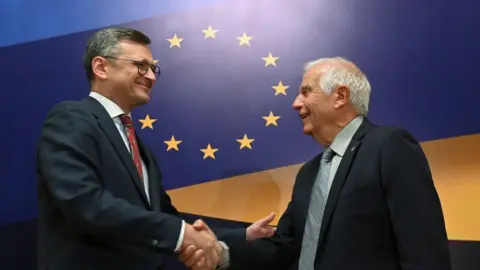Ukraine war: Russia warned EU not weary over war support
 EPA-EFE/REX/Shutterstock
EPA-EFE/REX/ShutterstockRussia has been warned not to count on "weariness" in Europe over support for Ukraine, as European Union (EU) foreign ministers meet in Kyiv.
It is the first time the assembly has been held outside the bloc. Ukraine is not an EU member but wants to join.
The meeting comes a day after further military funding for Ukraine was left out of a last-minute US budget deal.
EU policy chief Josep Borrell has described the ongoing war in Ukraine as an "existential crisis".
"Maybe it's not being seen like this for everybody around the world, but for us, Europeans, allow me to repeat it: it's an existential threat," Mr Borrell told the gathering on Monday.
"And that's why we have to continue supporting you and discussing with our American allies and friends for them to continue supporting you."
The EU has already announced more than €70bn (£60bn) of military and civilian assistance for Ukraine, which is set to arrive over the next few years.
Mr Borrell has said that "sustainable and predictable" is what the bloc is striving for with its military support, and is keen to highlight the fact that support and sanctions continue to be voted through by member states.
Meanwhile French Foreign Minister Catherine Colonna described Monday's gathering as a "demonstration of our resolute and lasting support for Ukraine, until it can win".
"It is also a message to Russia that it should not count on our weariness. We will be there for a long time to come."
The US budget deal, which is a temporary measure, did not include $6bn (£4.92bn) in military aid for Kyiv.
But President Joe Biden, who has already approved some $46bn (£37bn) in military aid since Russia launched its full-scale invasion last year, said Kyiv could "count on" US support.
The Kremlin says it believed conflict fatigue would grow in both Europe and the US but that Washington would continue to be directly involved in the conflict.
Ukrainian Foreign Minister Dmytro Kuleba said on Monday that he thought it had been an "incident" rather than an example of waning support.
Hardline Republicans in the US oppose further military aid for Ukraine, with many openly opposing President Joe Biden's approach to the war.
"We are now working with both sides of Congress to make sure that it does not (get) repeated again under any circumstances," said Mr Kuleba.
"So we don't feel that the US support has been shattered."
Ukraine has been making some progress in its pushback against Russia - widening the breach in Russia's defences in the southern Zaporizhzhia region.
It has also made advances around Bakhmut after Russia moved some of its most experienced troops from there to strengthen defences further south.
But progress on the ground has been slower than hoped overall and while Ukraine has been able to rely on its military progress in the past as political currency, it is now having to utilise diplomacy more than ever.
Speaking to reporters at the EU meeting, German Foreign Minister Annalena Baerbock called for a strategy to insulate Ukraine from attacks on the country's power grid, which left millions without heating last winter.
"Ukraine needs a winter protection plan of air defence, generators and a strengthening of the energy supply," she said.
But there are cracks appearing within the EU. It's notable that two of the countries known to have the most issues with Ukraine, Poland and Hungary, have not sent their foreign ministers to Kyiv, and are instead being represented at state level.
And on the weekend a pro-Russian candidate won the parliamentary elections in Slovakia, an EU member.
Robert Fico, who is a former prime minister, is expected to start coalition talks on forming the next government.
He has previously pledged an immediate end to military support for Ukraine.
Mr Kuleba said it was "too early to judge" how the election result would impact his country.
Political developments within the EU - including Slovakia's recent election result, a polarising election campaign in Poland where Ukrainian support is being scrutinised, and Hungary's continued attempts to block Western aid - mean the EU's task of creating total unity within its membership will be far from easy.
